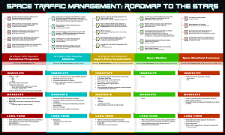Location
Jim Henderson Welcome Center, Embry-Riddle Aeronautical University - Daytona Beach
Start Date
6-11-2014 1:30 PM
Abstract
This paper examines what space debris consists of and where it came from. In 1958, astronomer Clyde Tombaugh published the results of his research into the existence of natural debris near the Earth, concluding that no such debris existed. During the ensuing fifty-five years, man-made debris has been accumulating to the point that it threatens launches, active satellites, and the International Space Station. NASA reported that as of 2013, more than 21,000 pieces the size of a softball or larger were being tracked, as were about 500,000 pieces at least the size of a marble and “many millions” of pieces too small to track. Understanding the history and content of space debris can be useful in developing mitigation measures and strategies to prevent additional debris from accumulating.
Area of Interest
Space Situational Awareness
History of Space Debris Slides
The History of Space Debris
Jim Henderson Welcome Center, Embry-Riddle Aeronautical University - Daytona Beach
This paper examines what space debris consists of and where it came from. In 1958, astronomer Clyde Tombaugh published the results of his research into the existence of natural debris near the Earth, concluding that no such debris existed. During the ensuing fifty-five years, man-made debris has been accumulating to the point that it threatens launches, active satellites, and the International Space Station. NASA reported that as of 2013, more than 21,000 pieces the size of a softball or larger were being tracked, as were about 500,000 pieces at least the size of a marble and “many millions” of pieces too small to track. Understanding the history and content of space debris can be useful in developing mitigation measures and strategies to prevent additional debris from accumulating.



Comments
Click here for Loretta Hall’s Bio Page
Loretta Hall is a space historian and author of two related books, Out of this World: New Mexico's Contributions to Space Travel and Space Pioneers: In Their Own Words. She is a member and Space Ambassador of the National Space Society, and a member of the Historical Society of New Mexico's Speakers Bureau.
Contact information:
Loretta Hall, Author
3219 El Toboso Dr NW
Albuquerque, NM 87104-3059
loretta@authorhall.com